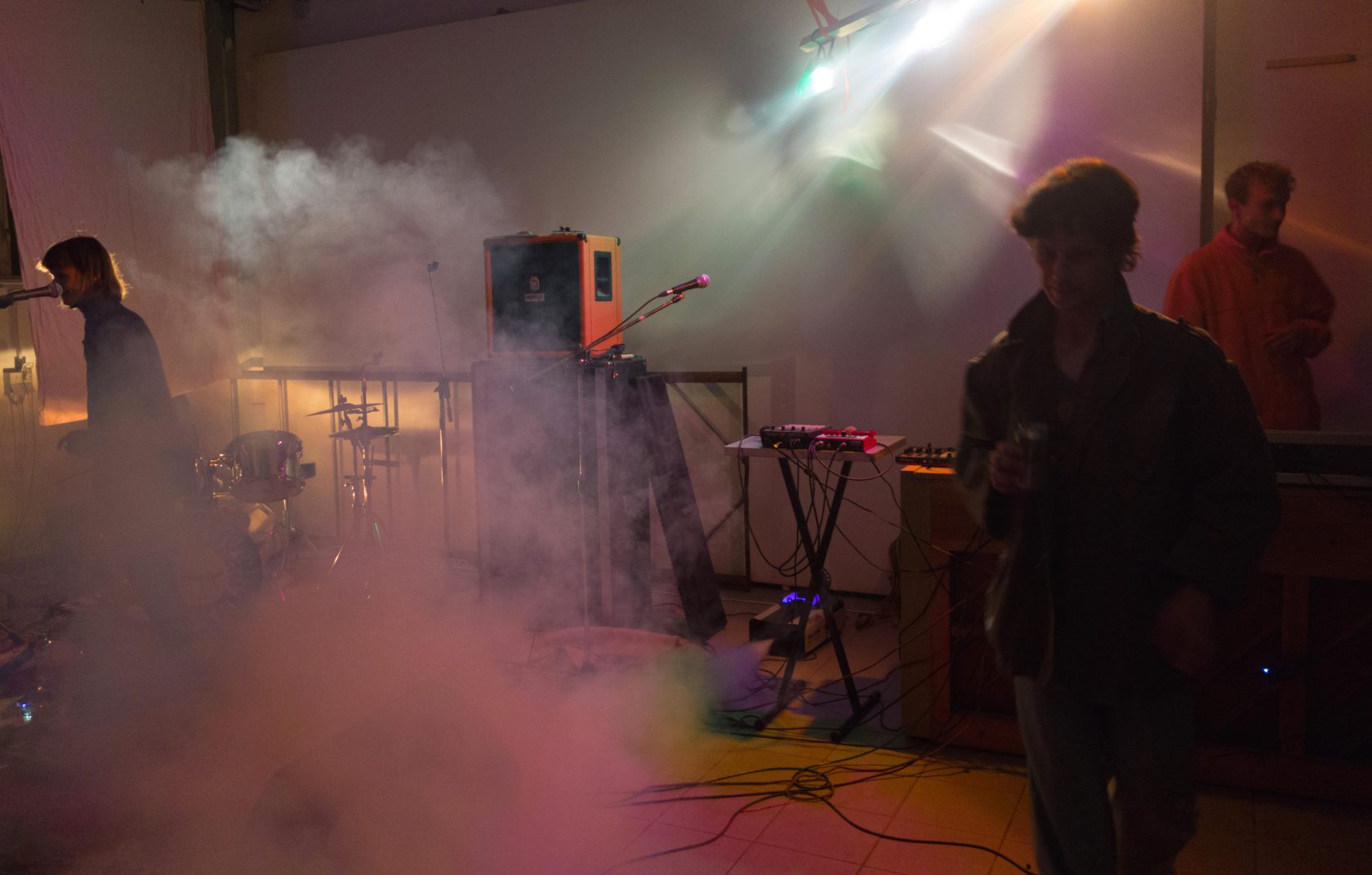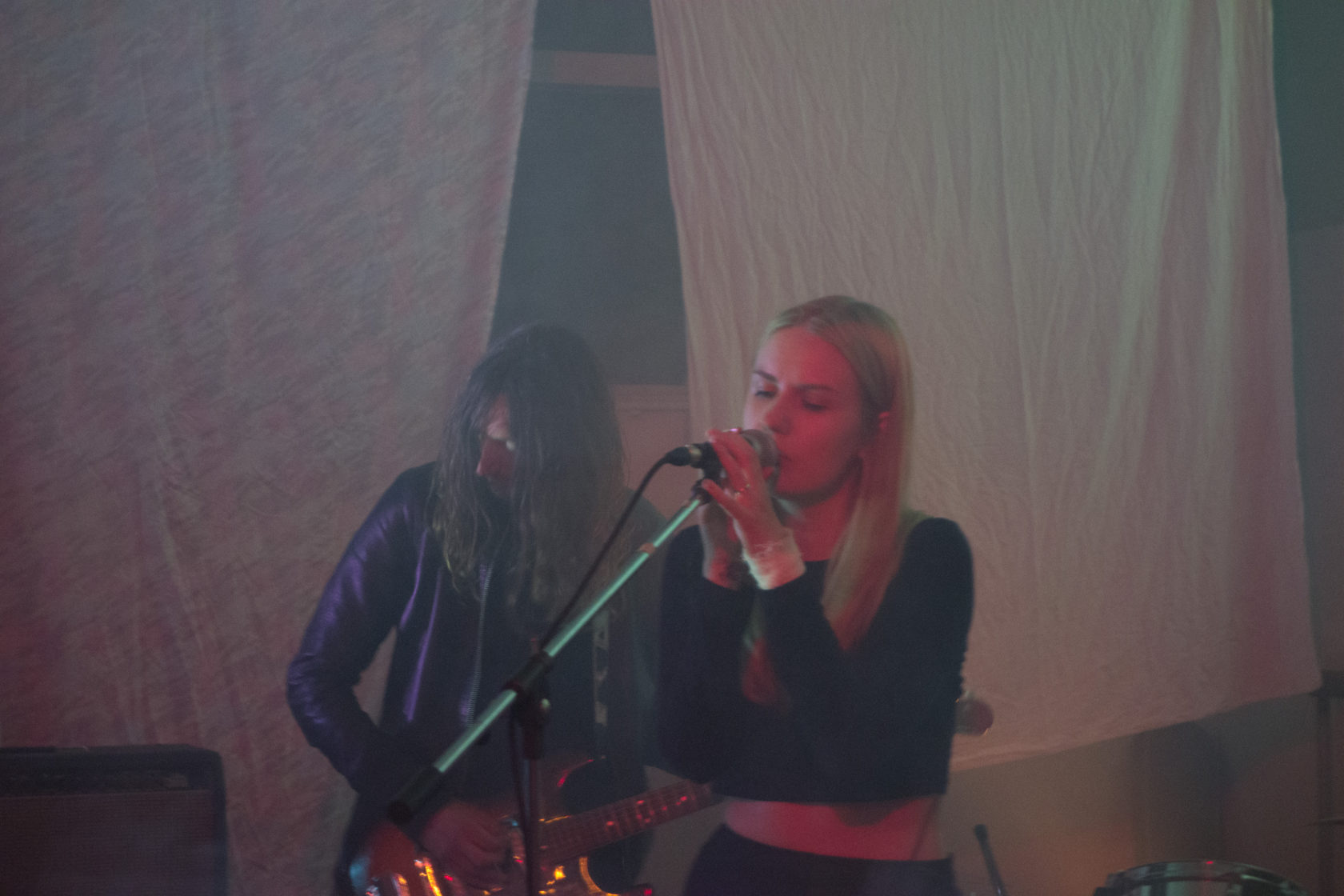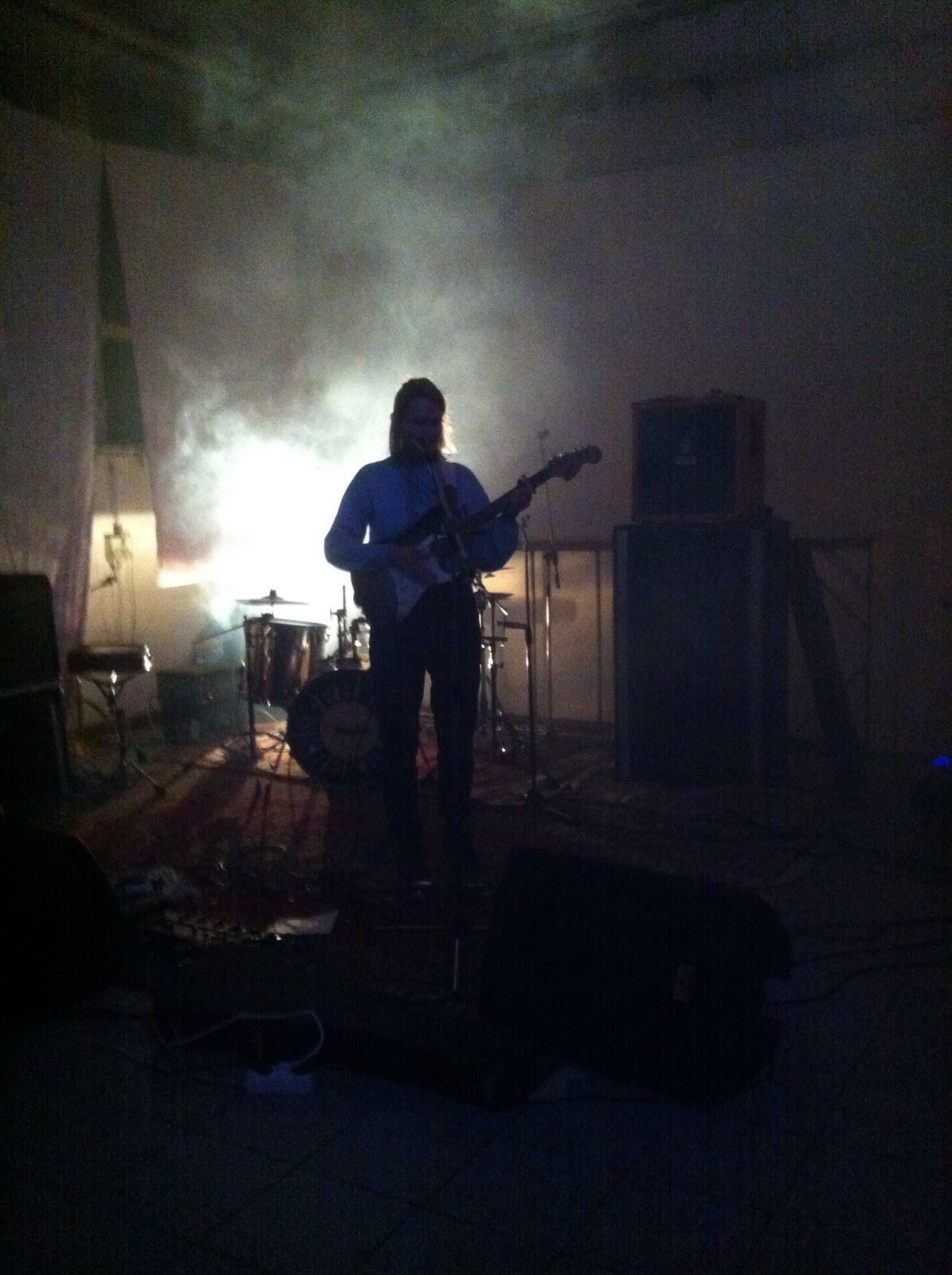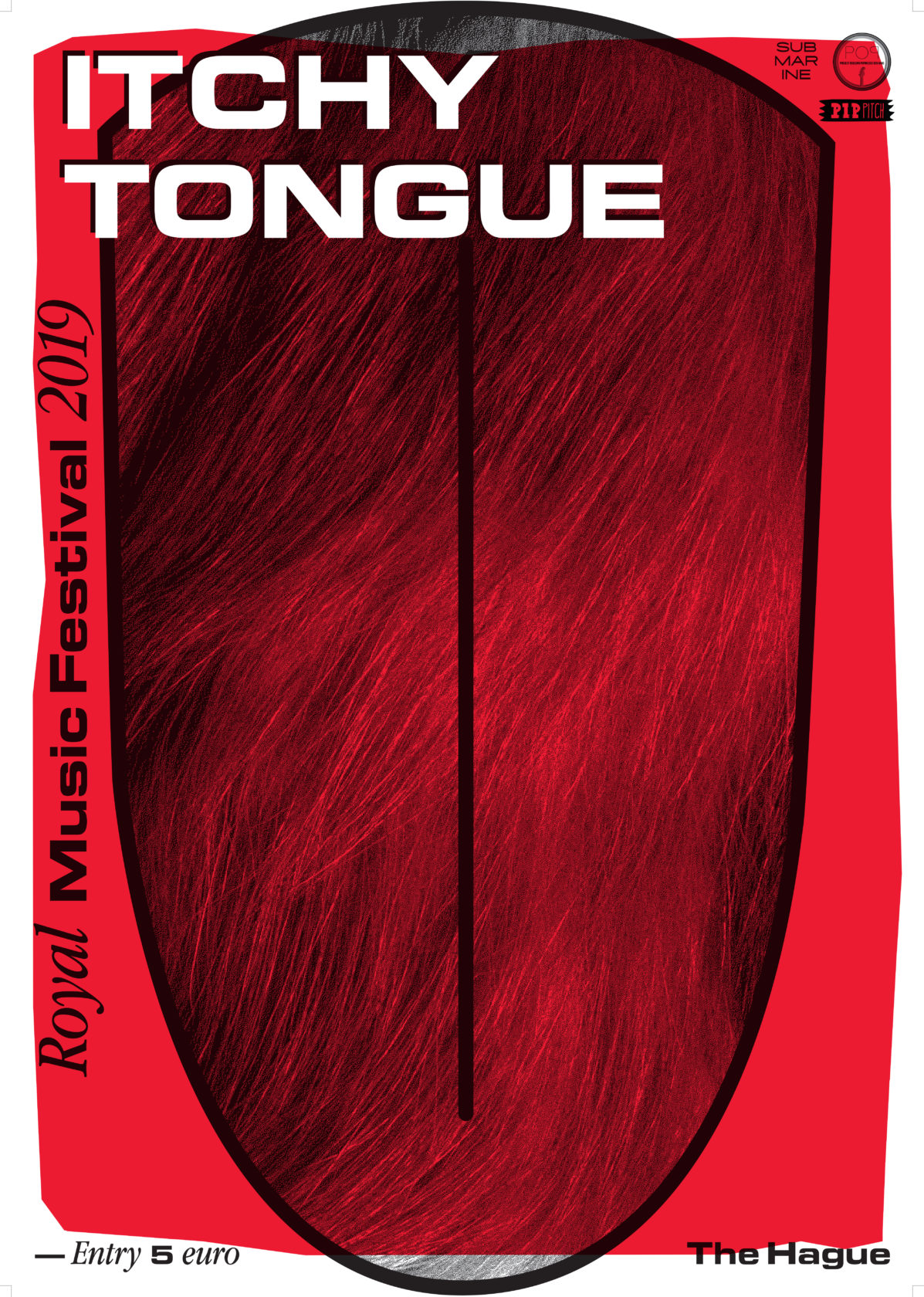On sound, image, and the ethereal with the founders of Itchy Tongue: Royal Music Festival
Earlier this month, I had the chance to sit down with Katerina Sidorova, Katerina Konorovska, and Bauwien Ubbens, the three founders of Itchy Tongue: Royal Music Festival. Itchy Tongue is a music festival and exhibition, now in its second edition, showcasing artists and art school alumni who are making music. Read below our conversation on art and music and what they hope happens when the two scenes intersect.
In your own words, what is Itchy Tongue? Can you give me the elevator pitch?
Bauwien Ubbens: All three of us graduated from the fine art department at the KABK. We met each other after we graduated and were talking about how we were all making music and how this is all disconnected from the practice so we hatched this plan to organize a festival and to connect all these music making artists but also to involve the music audience that is not necessarily in the art scene.
Katerina Sidorova: And the other way around, involving an art audience in the music scene. It’s a big showcase of The Hague art meets music scene. Most bands are art school graduates or are related to studying art or making art and it’s trying to show that side of the practice and unite the artists
Is there a selection process? Are bands invited?
KS: Well, first it was close friends that we knew would be up for it. This time around, we’ve had people contact us. We don’t do a proper open call but it’s more word of mouth and if it’s a fit and if it’s diverse enough and if we can keep the ten bands for that evening then we’re happy.
Katerina Konorovska: We like the bands we ask and always go for people who are good to work with. This year the number of bands has grown since we received support from Submarine, POP Radar and Power Pitch x PIP. We also had to make a nice balance so that there aren’t too many of the same sounding bands, even if we like it. Lately there are so many art bands. Every artist seems to be making music and performing.
KS: Even in the past two years, since the last edition of Itchy Tongue, it’s changed a lot. It’s been crazy.

What changes will be implemented after your 2017 edition?
BU: It’s more serious than last year. We can get equipment from PopRadar because we received funding this year.
KS: This year we have a bigger team to work with. It’s also a more diverse program and it’s combined with open studios and an art auction. More people are involved and it’s grown. The big difference was the first time organizing Itchy Tongue, it was our own initiative and this time we were asked. Friends kept asking us about whether it was coming back and then being asked by Berk Duygun, who was one of the DJs last time, that was the initial push to do it again this year. We learned from our mistakes from last time, what was more complicated. This year we got professional funding.
KK: And that means we can pay the artists and musicians better this time. That was the reason we applied for funding. Not to get better equipment, even though that’s great, but we wanted to make sure that everybody who is participating can be compensated.
How does an artist fee transition into the music scene and vice versa? Has this been a topic of discussion between you three?
KS: I’ve been thinking about that a lot and was recently speaking to my bandmate, Niels van Ruiten, about it. For him, it’s more likely for him to get paid for gigs but I think overall there is finally a bigger recognition for artistic labor, monetarily. It’s pretty common that bands will get paid less than artists if they get paid at all and we try to find a bit of a middle ground and pay a fair wage for what is being done.
KK: In my experience, when I was playing with my band at venues, we would already get some money at the door and I was shocked and just thinking “wow” because if I did an exhibition somewhere, I usually didn’t get any money at all. That’s awful. On the other hand, as an artist, when you have an exhibition there is still a chance you can sell the work. Unlikely, but maybe. I think everybody is having a different experience. I also did an exhibition where I was paid for transport and material. It depends.

As all three of you are both musicians and artists, is it possible to give each creative career the same amount of attention?
BU: For me, music was always something I was just doing. So I was writing songs and then I was studying fashion and then I went from fashion to fine art. But music stayed. The music part suits my way of working. It feels very natural and intuitive and I like playing with text, and how everything comes together in the end. I really like the ephemeral aspect of music so that’s also why I really think that music is the main focus for me.
Do you find value of positioning your music in an art context or does that not matter?
BU: I was doing performances at KABK but it was music related and I always had the feeling I had to connect these two. And I still feel like I want to intertwine them but I haven’t found a way yet.
And, which came first: the music or the art? At what point did they intersect if at all?
KK: I think we all three have very different experiences. Because for me, I always made the visual stuff. I started this small band with my sister when I was 14 years old, recording songs but nothing serious. More recently, I was surrounded by musicians in my studio and I felt they were missing a singer. Then one day while I was working with textile and weaving, I got involved and we had a really good time. Then all the sudden I was going again and again and the next day. I had this 40 min long bike ride from my studio to my apartment and there was a rhythm to the cycling. I was making songs and writing while I was biking. I was opening up this performative part with text, instead of only painting and it feels like it really fits. Now I always try to make it an element of my practice.
KS: I never considered myself to be musical but getting together and making music in a casual way with friends a few years back, and meeting my current bandmate and finding that way to channel things contextually not fitting in my practice 100% was a very positive outlet. For me, visual art is still the main activity and then research and organization, but having that little island of music that’s more unique and personal to my experience, that that is very helpful. More emotional things I can channel through that, which I can’t do with my artwork. I’m quite happy with this separation.

Do you feel like you’re leading a double life?
KS: It sounds very self-involved but me the organizer, me the artist, me the philosophy student, me the musician, it’s all facets of who I am. Every performer participating in Itchy Tongue has their own unique experience with this. The only thing that unites them, in this case, is that they all have the experience of visual art. I think that translates into the music they make, very interestingly. There seems to be more theatrically, and performative aspects to it. More things are thought about from the visual side as well. About how you look on the stage, to album design, to music videos, to graphic identity.
Preparing for this interview, I was reading a lot about famous artists in bands and for many of them, being in a band was a sort of “fuck you” to the art world? Do you feel like you’re operating outside the competitive, constructive art world? Are you rebelling against something that can be product based?
KS: For me it’s definitely a different world. The music scene that I know is way more free and friendly because there is less of a vain, career aspect to it. If you make music, yeah maybe you can get big but for most people it’s just there for a group to come together and have a good time. It’s more community based. Making a big event and incorporating that, it’s very liberating.
KK: I think that’s important. We are open for experiments and mistakes and failures. You don’t have to succeed. Because this isn’t a job, there is a fun aspect to it. I really like that. What’s also different for me being in a band, it’s not just one person in the studio. In a band, you have to find this balance or connection or harmony between all the members. I don’t feel any pressure to succeed, I just want to have fun.
BU: There is a lot of that collective enjoyment aspect. Just going for things and having a good time.
KS: It’s also really important for Itchy Tongue that we promote experimentation. Some of them don’t really know what they’re going to do. There are also bands that are performing that have been around The Hague for quite a long time. It’s interesting to have a mix. We’re trying to give equal opportunities to all levels. Which I think does relate to our experience as women in the art world. Not waiting to be picked up, but doing it for ourselves and in the meantime once the stage is there, sharing it with as many others as we can.
What do you want people to walk away feeling? What’s the ideal outcome from Itchy Tongue?
KS: I want them to discover new music that they might not have otherwise. I want them to enjoy themselves and enjoy the diversity that The Hague has to give. As long as they don’t break anything.
KK: The most important is the freedom to the bands that there is a chance to experiment and bringing something different and an audience can witness that.
Why should people buy a ticket and come to Itchy Tongue?
BU: I think it’s one of the most friendly festivals. I was really happy about that last year. Everyone was really helping each other. No one puked on the floor. It’s also really nice to find out about all these new bands. There’s going to be nice food. It’s next to the water. It’s just a very friendly atmosphere.
KK: Yes, there will be food and ice cream.
KS: We try to plan it at the end of summer, early autumn so it’s a big event to celebrate the end of vacation and the beginning of another creative year.

Itchy Tongue takes place at De Besturing, Saturnusstraat 91, The Hague on October 19, 2019. Entrance is 5 euros.